| dc.contributor.advisor | Huysamen, Elsabe | |
| dc.contributor.author | Palmer, Aurial Kim | |
| dc.date.accessioned | 2023-05-10T08:45:53Z | |
| dc.date.available | 2023-05-10T08:45:53Z | |
| dc.date.issued | 2023 | |
| dc.identifier.uri | http://hdl.handle.net/11394/9889 | |
| dc.description | Magister Legum - LLM | en_US |
| dc.description.abstract | The Employment Equity Act 55 of 1998 (EEA) was amended by the Employment Equity
Amendment Act 47 of 2013 (EEAA), which, amongst others, introduced sections 6(4) and 6(5)
into the Act. Sections 6(4) and 6(5) of the EEAA was enacted to broaden the prohibition of
unfair discrimination in the workplace and strengthen enforcement mechanisms. The
amended EEA recognises inequalities in employment, occupation, and income within the
labour market.
This study will focus on the principle of equal pay for work of equal value as incorporated in
the EEA as part of anti-discrimination law in South Africa amongst others. It will consider the
employers’ obligations under equal pay of work of equal value and how section 6(4) claims
might give rise to a claim of unfair discrimination for purposes of the EEA. In considering the
impact gender wage discrimination has in South Africa and globally, the focus of the research
will analyse the complexity of the principle of equal pay for work of equal value and the
provision thereof in the EEA. In doing so, the application of the principle of equal pay for
work of equal value in the jurisdictions of Australia and India will be considered. | en_US |
| dc.language.iso | en | en_US |
| dc.publisher | University of the Western Cape | en_US |
| dc.subject | Direct discrimination | en_US |
| dc.subject | Employment Equity | en_US |
| dc.subject | Equality | en_US |
| dc.subject | Gender Wage Gap | en_US |
| dc.subject | International Labour Organization | en_US |
| dc.title | ‘Equal Pay for work of equal value’: Unfair discrimination within the South African workplace – A comparative study | en_US |
| dc.rights.holder | University of the Western Cape | en_US |

